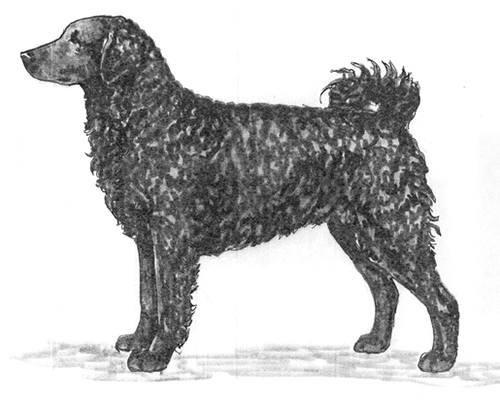Frisian Water Dog
Gun Dog Group
The goals and purposes of this breed standard include: to furnish guidelines for breeders who wish to maintain the quality of their breed and to improve it; to advance this breed to a state of similarity throughout the world; and to act as a guide for judges.
Breeders and judges have the responsibility to avoid any conditions or exaggerations that are detrimental to the health, welfare, essence and soundness of this breed, and must take the responsibility to see that these are not perpetuated.
Any departure from the following should be considered a fault, and the seriousness with which the fault should be regarded should be in exact proportion to its degree and its effect upon the health and welfare of the dog and on the dogs ability to perform its traditional work.
History
Dutch breeders created the Frisian Water Dog about 400 years ago, probably from an older breed that was simply known as Old Water Dog. The dogs were originally used by fishermen to kill otters. When otters became less trouble for fishermen, the dogs began being used for hunting and guarding. The breed is very rare and is found almost exclusively in the Netherlands.
The Frisian Water Dog was recognized by the United Kennel Club in 2006.
General Appearance
A rugged, sturdy breed that is well balanced, square and covered with curly hair, except on the face, which is smooth.
Characteristics
Intelligent, stubborn and independent, the breed is friendly with its family and good with children but suspicious of strangers and makes a good guard dog.
Head
The head is dry, strong and powerful.
SKULL
The skull is slightly rounded, wider than it is long, and slopes gently into the cheeks. The skull and muzzle are of the same length, and the stop is slight.
MUZZLE
Powerful, tapering slightly from eye to nose, but not pointed. The nasal bridge is broad and straight. The lips are tight fitting.
TEETH
The Fresian Water Dog has a complete set of evenly spaced, white teeth meeting in a scissors bite.
NOSE
Well developed, with open nostrils, black or brown depending on the color of the coat.
EYES
Medium size, oval in shape, with tight fitting lids, the eyes are placed slightly slanting, giving the dog a somewhat grim expression. Color is dark brown for black dogs, and brown for brown dogs.
Fault: Yellow eyes.
EARS
Set rather low and carried close to the head, the ears are moderately long and shaped like a masons trowel. They are covered with curly hair that is rather long at the set on of the ear, gradually shortening to the tip.
Neck
Short, strong, arched and carried low. No dewlap.
Forequarters
The shoulder blade is well placed against the chest, obliquely set and well angulated.
FORELEGS
Powerful and straight, with upright pasterns.
Body
The body is very powerful. The chest is wider than it is deep, so that the forefeet are rather wide apart. The ribs are well rounded and reach well back. The back is short and straight, and the loin is strong. The croup is only slightly sloping. The underline is moderately tucked up.
Hindquarters
Powerful, and moderately angulated.
HIND LEGS
The lower thigh is not too long. The rear pasterns are short.
Feet
Round, with thick pads and well arched toes.
Tail
Long, and carried as a ring tail curled over, or beside, the croup.
Coat
With the exception of the head and legs, the body is covered with tight curls of firm hair. The coat is coarse, and has a greasy feel.
Serious Fault: Sparse or thin hair which gives the dog a wooly appearance.
Color
Solid black, solid brown, or black or brown with white markings, with or without ticking.
Height
Ideal height at the withers for males is 23 inches. For females, it is 21.5 inches.
Disqualifications
(A dog with a Disqualification must not be considered for placement in a conformation event, and must be reported to UKC.)
Unilateral or bilateral cryptorchid.
Viciousness or extreme shyness.
Albinism.

Looking for a Dog?
Find a dog that will fit your family.
Note: The breeders on this list are not endorsed by UKC.
©Copyright 2006, United Kennel Club
